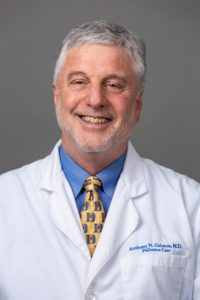SGO Wellness: Grief Needs Recognition | Anthony Nicholas Galanos, MD, MA

Anthony Nicholas Galanos, MD, MA
I am a doctor who has had the privilege of doing debriefs with all kinds of physicians after tough deaths. I am also a senior clinician who has had the privilege of other clinicians talking to me after a serious personal loss, be it a divorce, the death of a spouse or the death of a child. I come away not sure why we are not talking more about these life changing events. If for no other reason than our own well-being and threat of burnout, let’s put grief on the front page.
Where do clinicians learn about grief? I wish we could say from their lengthy education, training, or even from more senior mentors, but it appears it is mostly on the job experience. All too often, coping with grief starts early. In a survey of medical students, two-thirds had experienced grief before even coming to medical school, and this loss had repercussions on their learning [1]. So, if we are starting in medical school and other professional schools with some personal loss, what is the impact of taking care of folks with serious illness, many of whom die after years of a close and meaningful relationship? What is the impact of “cumulative grief” on providers and doctors over time? I would submit that we include “grief” in the models that predict burnout and dissatisfaction with our work. What are we missing here?
Clinicians and families experience “gruilt” [2], which is 80% pure grief mixed with 20% guilt. This term, gruilt, works well and it applies to families who say, “if only I had gotten my wife to you sooner,” applies to the resident who says, “I missed something,” and to the attending who wonders if they could have done more.
If we acknowledge grief and its profound impact, we can be more supportive of one another. In a recent paper, there is a description of oncologist grief and suggestions on how we might manage our own grief. The first and most important notion is to allow the time and space to process grief. Doctors are not keen on spending time on yet another activity, so this must be woven into the fabric of clinical practice like the “debriefs” mentioned above (peer to peer support, not counseling or judgment); narrative medicine and journaling and an even shorter intervention, “the pause” [3]. So, after a code or when we learn that someone our clinic has cared for some time has died, we could offer one minute or less, for silent reflection, to acknowledge the sadness of the event. It has been written that the only real medicine for grief is “acknowledgement” [4].
Clearly, much more education is needed for clinicians of all types, and a call to action would be for senior oncologists/attendings to be available for their younger colleagues and trainees. Younger clinicians need the time and mentorship of others to build that internal architecture, that scaffolding, if you will, on which to hang the sad events that are woven into our work.
Grief needs recognition. The norms and expectations around loss and bereavement need to evolve as much as policies regarding parental leave have [5]. There can be policies and interventions that allow time and space for our grief. Only in this way can we continue to be available for our patients and their families, and to care for ourselves and our colleagues.
REFERENCES
Price MJ, Wachsmuth LP, Ferguson KA, et al. Grief in medical students: The short and long-term impacts on health and well-being. Am J Hosp Palliat Care. 2022;39(2):196-204.
Galanos AN, Labriola MK. How we manage grief. Clin Adv Hematol Oncol. 2022;20:1-3.
Bartels JB. The pause. Crit Care Nurse. 2014;34(1):74-75.
Devine M. It’s ok that you’re not ok: Meeting grief and loss in a culture that doesn’t understand. Boulder, CO: Sounds True; 2017. 56 p.
Harrison KL. Making space for grief in academia. JAMA. 2021;326:699-700.
Anthony Nicholas Galanos, MD, MA, is a professor of medicine specializing in palliative care at Duke University in Durham, NC.